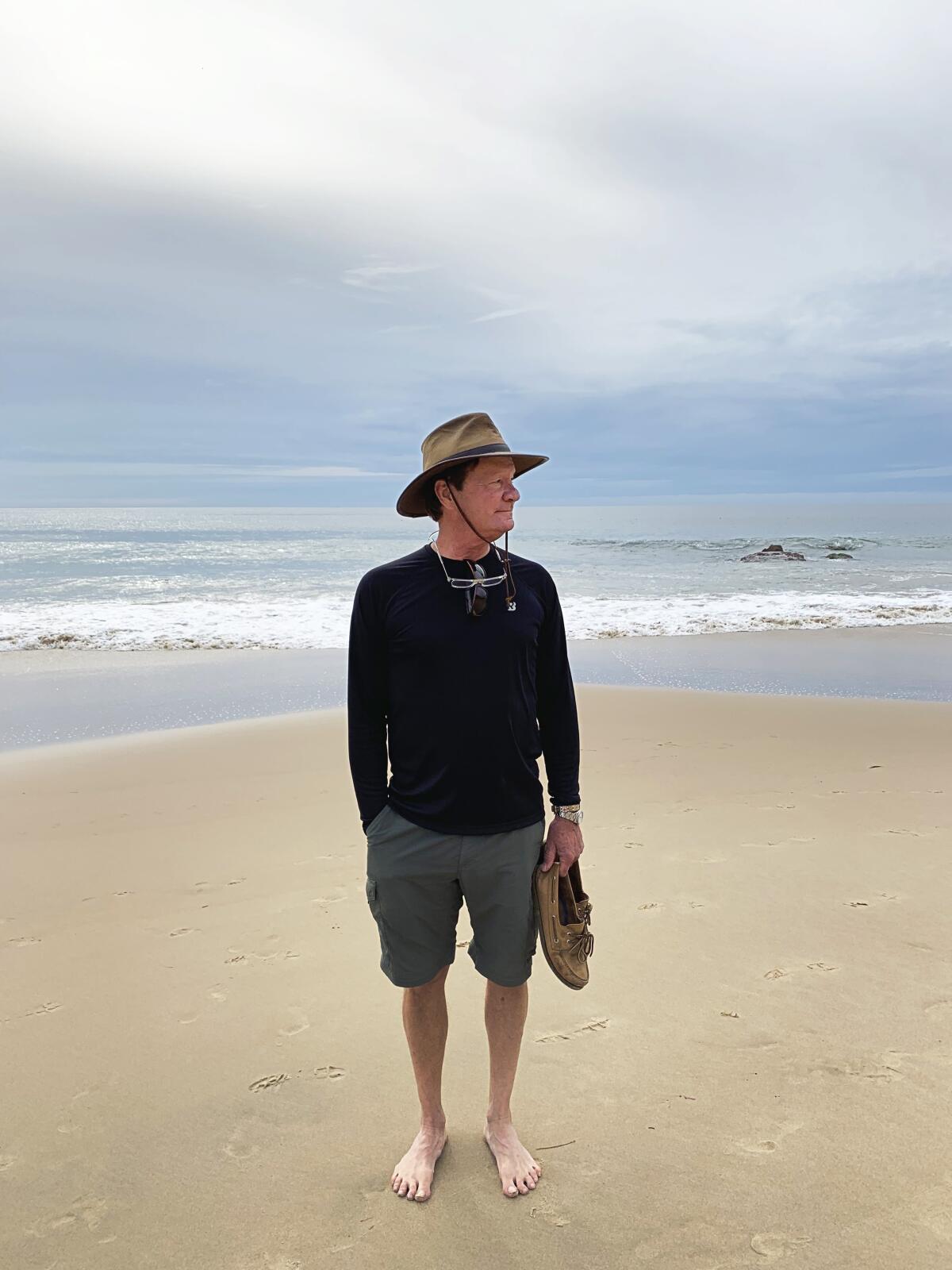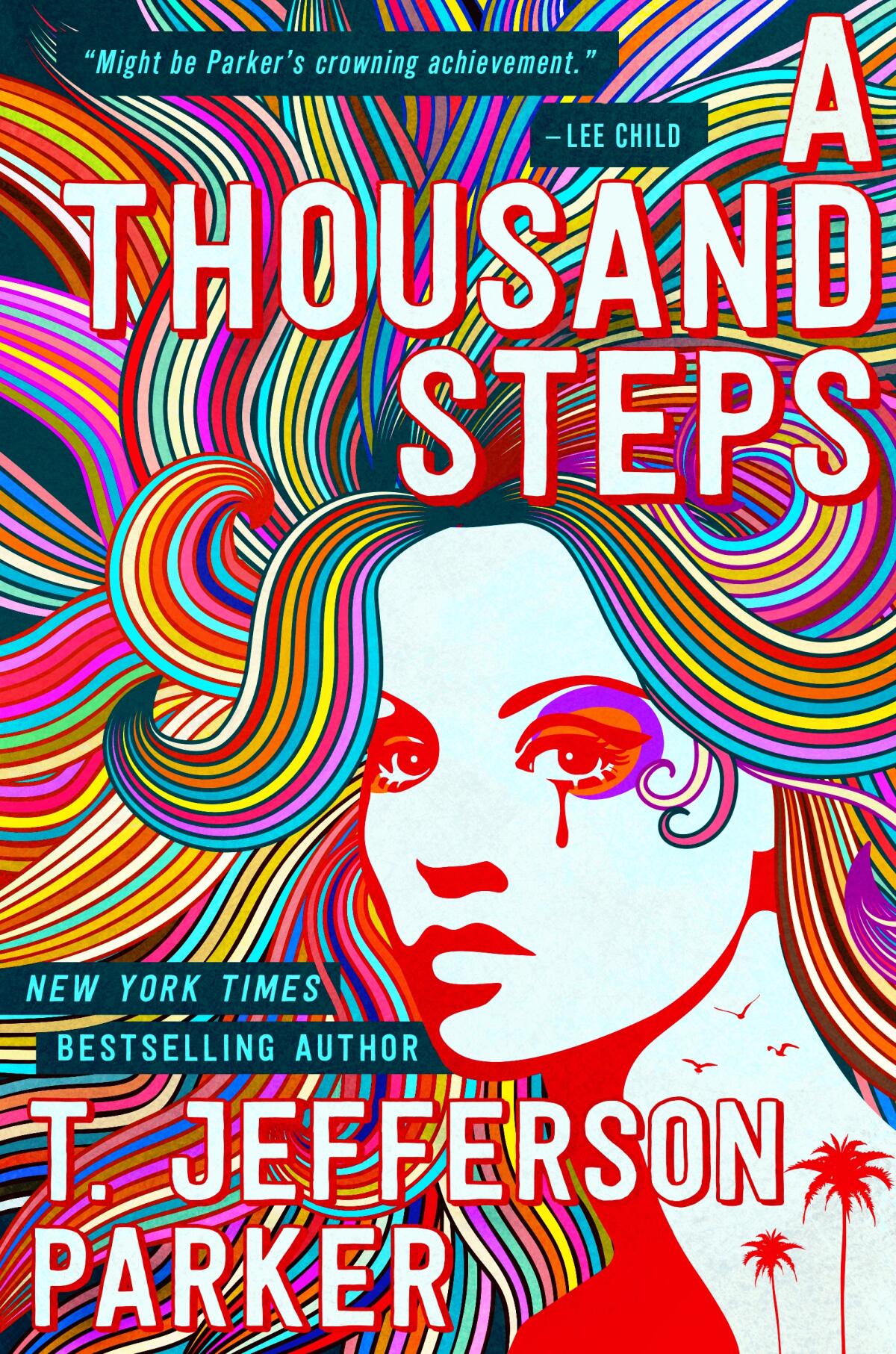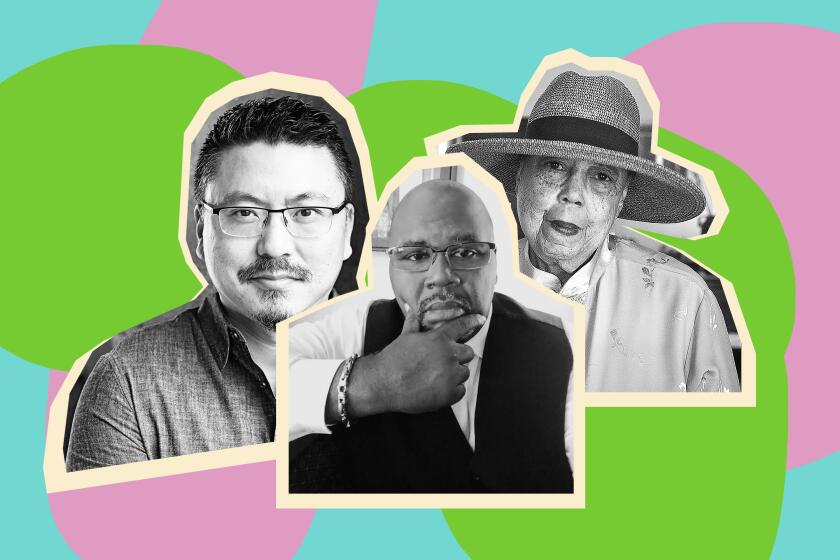Laguna Beach was a trip in the ’60s. So is T. Jefferson Parker’s hallucinatory new thriller

- Share via
On the Shelf
A Thousand Steps
By T. Jefferson Parker
Forge: 368 pages, $28
If you buy books linked on our site, The Times may earn a commission from Bookshop.org, whose fees support independent bookstores.
“It was the best of times; it was the worst of times, it was the age of wisdom, it was the age of foolishness.” Charles Dickens’ famous introduction to “A Tale of Two Cities” resonates when reading T. Jefferson Parker’s 27th mystery, “A Thousand Steps,” set not in pre-revolutionary Paris and London but in post-Summer of Love Laguna Beach.
Described from the perspective of 16-year-old Matt Anthony, his hometown in the summer of 1968 is awash in the afterglow of the countercultural revolution that started in San Francisco and rolled its way rapidly down the coast. It’s in this purple haze of sex, drugs and rock ’n’ roll that Bonnie Stratmeyer, a senior at Matt’s high school who’s been missing for two months, is found dead on a slab of rock near Thalia Street Beach.
Rumors of Bonnie’s death circulate fast in this little beach town (1968 population: 13,000). One story is that she got caught in a riptide and drowned. Another is that she’s a murdered federal informant. But when Laguna Beach Police Sgt. Bill Furlong asks Matt, who is pedaling by the scene that night after fishing, “Was she a head?,” it’s a reasonable question. The local cops have encountered a not-insignificant number of drug-addled leaps from hotel balconies.
A longtime haven for artists, Laguna Beach has become the headquarters of Timothy Leary, the former Harvard lecturer and LSD researcher. It was Leary who, at a 1967 San Francisco human be-in attended by Allen Ginsberg, Lawrence Ferlinghetti, Dick Gregory and others, popularized the phrase “Turn on, tune in, drop out.” Now he’s migrated south to join forces with the Brotherhood of Eternal Love, a religious group that advocates the use of LSD for spiritual enlightenment.
In “The Last Man Takes LSD,” two authors track Foucault’s late-in-life rightward turn, beginning with a hallucinogenic 1975 visit to Death Valley.
Matt works at Mystic Arts World, a head shop, art gallery and community center owned by the Brotherhood. But Matt’s no stoner; he is paid for his time with a selection of the gallery’s art books, which inspire his drawings but don’t put food on the table. For that, he’s forced to fish from local piers, run errands for wealthy residents and work a bicycle paper route.
He is, in other words, fending for himself. His father, Bruce, a former Laguna Beach cop, abandoned the family years ago. His mother, Julie, works as a waitress when she isn’t stoned on pot or worse. Matt sleeps in the garage of their tiny rental house. His sister, Jasmine, has just graduated from high school and is itching to break free. After one particularly brutal fight with her mother, Jazz storms out. Meanwhile, Matt’s brother Kyle is a tunnel rat in Vietnam, weeks away from discharge. Matt doesn’t like to write Kyle about bad news, like Bonnie’s death or Julie’s out-of-control drug habit. But soon, Matt’s keeping an even bigger secret from his brother: Like Bonnie before her, Jazz has disappeared.

The cops largely drag their feet, writing off Jazz as just another teen runaway. Only Officer Darnell, the department’s lone woman, believes Matt and his mother, but she must do battle against the lethargy of her colleagues. Darnell notwithstanding, Matt knows he can’t trust “pigs” like Furlong who roust his friends at Mystic Arts from a white police van dubbed Moby Cop and lean on him to inform on the Brotherhood’s more nefarious activities. In the summer of ’68, it’s cops versus hippies, and Matt is in the middle. “Matt wants to side with the young and free, of course, but he’s not sure how,” Parker writes. “Smoke pot? Wear that lame tie-dye hippie stuff?”
After writing 12 novels in nearly 20 years set in the stretch of the Sun Belt south of Los Angeles, T.
Matt’s relentless quest to find his sister, save himself from being collateral damage in his mother’s drug-induced spiral — hell, just wrangle some food, art supplies and a date with girlfriend Laurel — form the emotional core of “A Thousand Steps,” which is as much a thoughtful coming-of-age novel as a probing mystery. What keeps its elements in balance is Parker’s assured dive into SoCal history, this time the cultural war zone that was Laguna Beach in the late ’60s. It’s territory that Parker, an Orange County native and a former reporter for two newspapers there, has mined throughout his decades-long career, from his crackling 1985 debut, “Laguna Heat,” to 2004’s Edgar Award-winning “California Girl,” which also featured an appearance by Leary and, chillingly, Charles Manson.
Drawing on that deep background and further inspired by nonfiction works and eyewitness accounts, Parker smoothly melds fact with fiction. Real-life cameos by Leary at the Brotherhood’s drug-induced “experiences” mingle with the quasi-fictional, like psychedelic artist Christian Clay or swami Mahajad Om, whose Vortex of Purity, in an old Catholic seminary in the hills, promises young seekers “Evolution, Enlightenment, Ecstasy.” As Matt, Laurel and most significantly Bruce (who has returned to find his daughter) are drawn deeper into increasingly dangerous schemes, Matt must decide how far he’s willing to go and whom he’s willing to betray, or worse, to find and free Jazz.
“A Thousand Steps,” its title taken from one of the city’s famous beaches, is as powerful as a riptide in summer. And like those deceptively strong currents, Parker crafts this mystery slowly at first, until the cultural forces he’s laid bare threaten to inundate a family trying to stay afloat. In the process, “A Thousand Steps” reopens for our reconsideration the consequences of clashes between authority and freedom, order and chaos, that persist to this day — and the innocents that will always get caught in the tumult.
Five reviewers of crime fiction recap dominant trends in 2021, including a profusion of diverse narratives, genre crossovers and, of course, true crime.
Woods is a book critic, editor and author of the Charlotte Justice series of crime novels.
More to Read
Sign up for our Book Club newsletter
Get the latest news, events and more from the Los Angeles Times Book Club, and help us get L.A. reading and talking.
You may occasionally receive promotional content from the Los Angeles Times.







